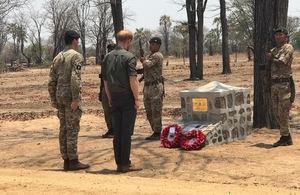Duke of Sussex visits UK troops on counter-poaching operations in Malawi
The Duke of Sussex met British Army personnel deployed to Malawi and paid tribute to Guardsman Matthew Talbot, who sadly died there earlier this year

The Duke of Sussex met British Army personnel deployed to Malawi and paid tribute to Guardsman Talbot, who sadly died there earlier this year. Crown copyright.
In Malawi, the Duke of Sussex watched a joint demonstration between Malawian Parks rangers and the British Army in Liwonde National Park, managed by African Parks in partnership with Malawi’s Department of National Parks and Wildlife (DNPW).
The Duke is President of African Parks, which works alongside the Army to enhance ranger training, supplementing ongoing efforts to secure the parks for the benefit of the Malawian people and wildlife. His Royal Highness also lay a wreath and paid tribute to Guardsman Talbot, who sadly died earlier this year while on counter-poaching operations.
The Royal Gurkha Rifles, who took part in the display, have been in Malawi for two months building on three previous counter-poaching deployments to the country.
Liwonde National Park had been severely depleted of wildlife prior to 2015 when the Malawi Government invited African Parks to manage it in partnership with the DNPW. Thanks to effective management and an overhaul of law enforcement, supported by partnerships including with the British Army, no high-value species have been poached since 2017.
Defence Secretary Ben Wallace said:
The illegal wildlife trade is the fourth largest transnational crime behind drugs, arms and human trafficking and can have hugely destabilising consequences. Our Armed Forces are once again demonstrating their versatility and value by contributing to the conservation work taking place in Malawi.
Working with local communities and host Governments is key to our approach, we want to see sustainable, community led solutions that help promote security and stability for both the people and wildlife of Africa.
The counter-poaching ranger partnering programme is funded by the Department for Environment, Food and Rural Affairs (Defra) and delivered by the British Army. The programme aims to help reduce poaching at source by further improving rangers’ patrolling effectiveness and information sharing-skills, whilst the Army gains valuable experience in bush-craft from the rangers.
International Environment Minister, Zac Goldsmith said:
Wildlife crime doesn’t respect borders so we need to share skills and expertise worldwide. Our hugely successful ranger programme has helped disrupt poaching and smuggling across borders.
Tacking this appallingly destructive trade is a priority for the UK government, and today I want to celebrate and thank the rangers who perform this essential work.
Craig Reid, Park Manager of Liwonde National Park:
Well managed protected areas offer vital opportunities to conserve biodiversity, protecting species at their source while simultaneously improving security and driving socio-economic development to benefit hundreds of thousands of people in Africa.
The progress we have achieved together in restoring Liwonde, which has seen poaching dramatically reduced, key species returned and the park revitalised, is a testament to the Malawi Government’s leadership, and to the power of partnerships in allowing us to continue to grow our impacts so that both people and wildlife can thrive.